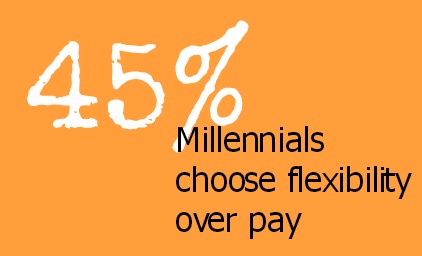By 2025, 3 out of every 4 workers worldwide will be Millennials (Time).
 Is that shocking to anyone else? One of the most impassioned discussions I heard at Columbia University’s recent Sales Thought Leadership Conference surrounded the younger generation and how they communicate in the workplace. Many were irked by their 20-something employees? aversion to picking up the phone or – god forbid – having a face-to-face meeting.
Is that shocking to anyone else? One of the most impassioned discussions I heard at Columbia University’s recent Sales Thought Leadership Conference surrounded the younger generation and how they communicate in the workplace. Many were irked by their 20-something employees? aversion to picking up the phone or – god forbid – having a face-to-face meeting.
It’s understandable? but, like it or not, this is the way of the future. Millennials are going to outnumber Gen X ers and Boomers in a matter of years. Why not begin pivoting your company’s culture to appeal to them now? It can’t all be bad. These kids? are brilliant when it comes to technology and finding information. They don’t have to keep facts and figures in their heads; they know that the solution can be found in seconds with a Facebook post to 800 of their closest friends. They don’t even need Google anymore! Older managers would do well to embrace these new entrants to the workforce; you might even learn something new.
There are plenty of reasons beyond the impending workforce takeover to hire Millennials. We haven’t begun to address their buying power. ?By 2018, Millennials will have the most spending power of any generation (Bazaar). They are your new sales force and your new customers. This applies in B2C and B2B sales environments. The old adage businesses don’t buy from businesses, people do? still applies. Both your digital and field sales teams need to understand this new buyers. ?People like to buy from people and brands they can identify with. When you consider your sales force and selling strategy, keep in mind that Millennials are looking for authentic, immediate interaction.
This leads us to a key component of sales: communication. It’s about getting your message across efficiently and effectively. The best salespeople and most efficient communicators figure out how their potential customers like to communicate and use that method as much as possible. Don’t be too concerned if your younger employees don’t want to pick up the phone – their customers may not want to either! There’s still a role for human interaction, but that interaction should now be at the choice of the customer, and approached in a collaborative rather than pushy manner.
 Once you bring Millennial talent into your salesforce, you have to retain them. If you don’t appreciate them, they won’t hesitate to find someone who does. I don’t know about you, but I’ve always found recruiting and training new talent is time consuming and expensive. So what if they prefer flexible hours and mobility? 45% will actually choose flexibility over pay (Millennial Branding), and replacing talent can cost $25,000. Infusing a little more flexibility and technology into your business will save you money and a few headaches. They want meaningful work, and they want to be left alone to complete it. This isn’t 1965; careers are their primary focus at 25, not children. They attach work to their identities and will approach a job with entrepreneurial passion. Look at this as positive – you don’t want to babysit anymore than they want to be babysat.
Once you bring Millennial talent into your salesforce, you have to retain them. If you don’t appreciate them, they won’t hesitate to find someone who does. I don’t know about you, but I’ve always found recruiting and training new talent is time consuming and expensive. So what if they prefer flexible hours and mobility? 45% will actually choose flexibility over pay (Millennial Branding), and replacing talent can cost $25,000. Infusing a little more flexibility and technology into your business will save you money and a few headaches. They want meaningful work, and they want to be left alone to complete it. This isn’t 1965; careers are their primary focus at 25, not children. They attach work to their identities and will approach a job with entrepreneurial passion. Look at this as positive – you don’t want to babysit anymore than they want to be babysat.
So what can you do? Don’t worry, you don’t have to “friend” your Millennial employee on Facebook to retain and communicate with them. Yes, they prefer to use social technology platforms to communicate and collaborate on-the-job. This can benefit you! They value latitude to share their ideas and creativity at work. If you can provide opportunities to share openly and collaborate, you’ll be able to hang on to fresh talent and leverage their seemingly-innate ability to grow your customer-base and your business. They like to learn and they like goals. Give them training and targets, and let them run. They’ve been billed “Trophy Kids” for a reason – they aim high and they are motivated to win!
How are you evolving your work style as the new generation moves in? Has it helped you? Be social and share!






